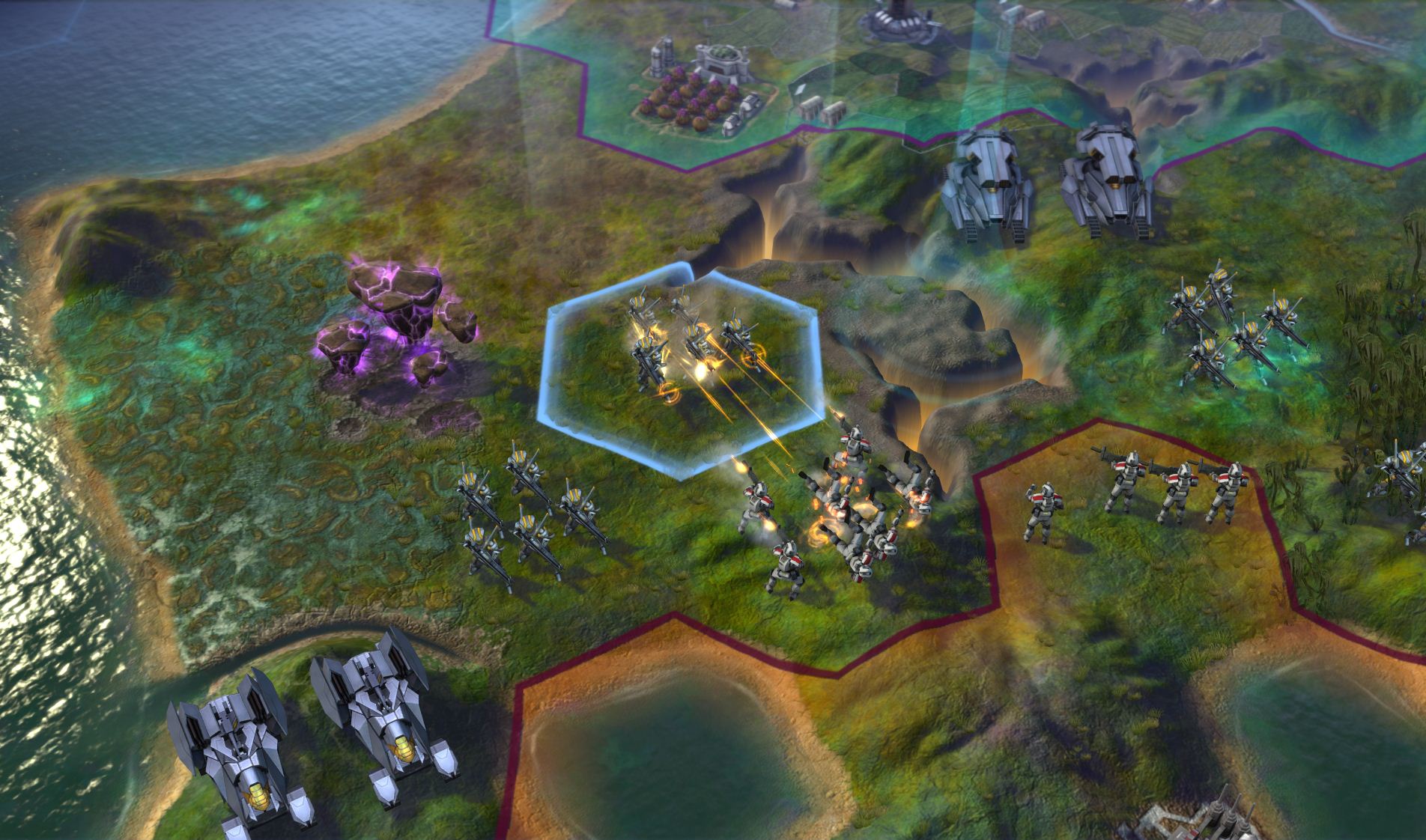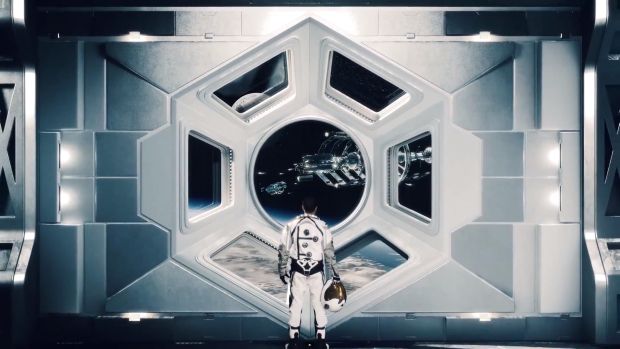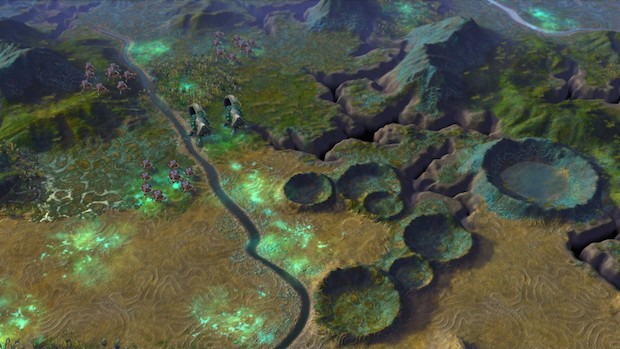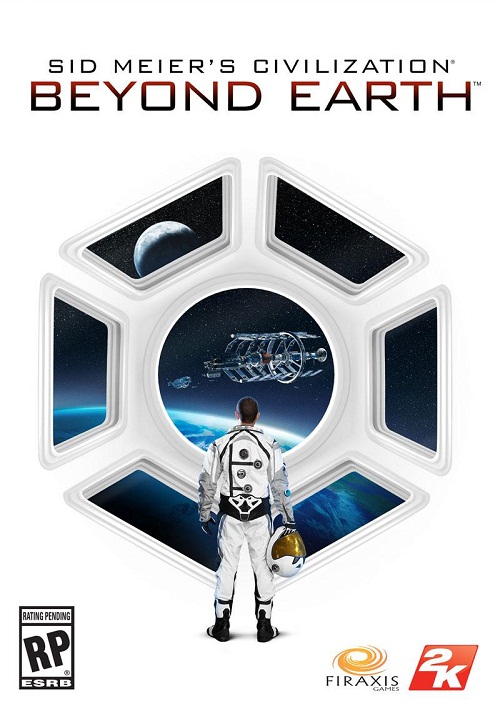
Civilization: Beyond Earth paints a very bleak picture for the future of humanity. Much like Christopher Nolan’s science fiction epic movie, Interstellar, which hit theaters around the same time as when Beyond Earth was releasing, humans, who have in the thousands of years of civilization, practically laid the earth to waste, find themselves in desperate need of a new home. Much like in Interstellar, these humans put all their hopes for the future of their species into cargo ships, carrying people and humanity into the far reaches of space, where they might find a new home. Much like Interstellar, in Beyond Earth, humans do find themselves a new planet to inhabit. And much like in Interstellar, there is far more to this new world than meets the eye.
All of this is just setup, however. This happens in the first five minutes of the game, it happens before you even begin playing. Most of this is conveyed to you before you can even get to the main menu, as the game’s uncharacteristically bleak intro movie plays. It sets the stage- it establishes, right from the get go, that this Civilization game is different. For all of this storied franchise’s history, it has concerned itself with only where mankind has been, offering players control over history, and how it plays out. Beyond Earth’s promise is something different. Beyond Earth seems to promise us that Civilization will now look to the future instead of dwelling on the past. And in those first few minutes, Beyond Earth warns us that that future may not be entirely to our liking.
You brace yourself for it, for all of the unpleasantness to come, and you set up a game, and begin. And then… it turns out to be the exact same thing as Civilization V.
"In the first few hours that you are playing Beyond Earth, it is very hard to shake off a feeling of disappointment, of being underwhelmed and let down. For all the grand scope that Beyond Earth seems to promise, with its premise, its setting, its inspirations (the classic turn based strategy game, Sid Meier's Alpha Centauri), and even its name, the game seems to play almost like a mod of Civilization V."
In the first few hours that you are playing Beyond Earth, it is very hard to shake off a feeling of disappointment, of being underwhelmed and let down. For all the grand scope that Beyond Earth seems to promise, with its premise, its setting, its inspirations (the classic turn based strategy game, Sid Meier’s Alpha Centauri), and even its name, the game seems to play almost like a mod of Civilization V. There you are, starting with a small settlement in a hostile, unexplored environment. You need to start researching technologies immediately, except now you are researching thorium reactors instead of writing and pottery, and you need to start exploring your surroundings. And when you do, you are running not into barbarians, but into aliens. Same story, different skin.
It’s hard not to feel cheated. Civilization: Beyond Earth has received a fair bit of hype, and not just in the traditional strategy game enthusiast circles either- Civilization V was an enormous hit, selling millions of copies, and finally breaking the series into mainstream consciousness. Beyond Earth, as its successor, had a lot of eyes on it. And for a while, it almost feels as if to pander to all the new fans who came in with Civilization V, Firaxis chose to play it disappointingly safe.
For a while. In the first few hours. To begin with. You’re noticing all the qualifiers I’m using, right? Cool. Because pretty soon, it becomes evident Civilization: Beyond Earth is anything but safe, that in all its rhythms of familiarity are hidden some brave new steps forward for the franchise, that the game truly, as its name suggests, leaves behind the earth-history trappings of its predecessors to hint at becoming something bigger.
The first indication that you get of this is the technology web. Yes, it’s a web now, not a tree, and the first time you see it, it’s hard not to get overwhelmed at its sheer expanse. At the same time, it is also hard not to feel a little cynical… surely this is just window dressing, and you can effectively choose and stick to one linear path of technological progress as you please, right?
As it turns out, you cannot. While the first few dozen turns of Beyond Earth will undoubtedly see you being pushed, or at least nudged, to make certain decisions about what kinds of technology you research, over time, you find that your progress through the technology web isn’t as simple and as linear as you would have hoped it would be.
"While the first few dozen turns of Beyond Earth will undoubtedly see you being pushed, or at least nudged, to make certain decisions about what kinds of technology you research, over time, you find that your progress through the technology web isn't as simple and as linear as you would have hoped it would be."
A large part of this is because of the new Affinities system, and Affinities is where Beyond Earth’s greatest mechanical triumph, as well as the horror of its underlying message, comes forth. You see, as you explore more and more of the world around you in Beyond Earth, you are suddenly hit with a realization- your environment and surroundings, and everything within them are, more than in any previous Civilization game, a constant factor. More than just the resource collection and exploitation that they were good for in previous games, your surroundings are a very real, constant threat that you have to contend with. In Beyond Earth, the biggest enemy isn’t even necessarily the other ‘civilizations’ with whom you compete- it is the unimaginably hostile, alien world that you find yourself on.
Take, for instance, the aliens that I told you you have to fight earlier. At that point in time, I made them seem like stand ins for the barbarians from Civilization V, but it soon becomes clear that they are more, much more than that. These aliens present a unified front- what you do to one of them will be remembered over time, and may come back to haunt you. These are aliens who were living on this world before you, and they have their own ideas of life and progress that are often at odds with yours. Your progress may often come at the expense of theirs- or vice versa. Everything that you want to do- from exploiting resources to even establishing trade routes- will be met with significant resistance, and more often, you will spend the early parts of your game fighting the world around you rather than each other.
In this scenario, presented with the omnipresent threat of an alien world and its inhabitants, you are given one of three ways to deal with all of it, ways that give you a leg up not only on your environment, but also on competing civilizations, while also changing the course of progress for your civilization, and potentially, all of humanity itself. You can choose to live in Harmony with your surroundings, slowly modifying your own genetics, as well as those of alien life around you, as you attempt to blend into the alien world and alien life forms that surround you. Doing so lets you live in harmony with the world around you, becoming allies with it rather than being at odds with it, being able to utilize it and its resources and aid you in your quest for victory. Doing so unlocks special ways to progress your civilization that are unavailable unless you choose this affinity. Doing so also comes at a great, horrifying cost, as you slowly begin to lose more and more of your humanity.
"In Beyond Earth, the biggest enemy isn't even necessarily the other 'civilizations' with whom you compete- it is the unimaginably hostile, alien world that you find yourself on itself."
Or you could choose to put your faith in your technology and machines instead, slowly integrating with them, and choosing to eschew the world around you and attempt to domesticate and tame it in your own image, an image unlike the planet you are now on, or the one that you originally come from. This, too, unlocks branches and paths to progress not otherwise available to anyone else. In this case, you don’t end up contaminating the genes of humanity with those of something else. But in this situation too, you have given up your humanity.
The final path available to you is to embrace that humanity. You eschew the environment around you, you eschew your advanced technology, and you attempt to build a new earth in the image of an old one. Once again, this leads you to paths of progress not otherwise available, but once again, the cost is horrifying, as you turn more and more inwards, kill everything at odds with your own outlook, and kill everything that doesn’t fit your increasingly narrower definition of what a human is. In your attempt to preserve humanity, you end up losing yours.
These affinities end up bringing unprecedented depth to Civilization: Beyond Earth, especially in conjunction with the tech web, as well as the factions that you end up aligning yourself with at the beginning of each game (think of it as picking a civilization in the older games), and the fact that the world around you is truly randomly generated each time you play. No two games are ever the same. Each game makes you question everything you do and always keeps you on edge.
Affinities have a more far reaching consequence tangible in terms of actual mechanics as well. It’s hard to say whether Civilization’s infamous, hilariously schizophrenic AI has actually seen much changes with Beyond Earth or not, but the AI, and everything that it does, suddenly seems to make so much more sense in context of the fundamental questions of our very humanity that we are all facing in this game. That, and the fact that there is a unique victory condition present for each affinity, leading to even more ways you can have a different game each time you play.
"Civilization: Beyond Earth is a game best experienced by yourself, without a whole lot of it spoiled. It gives you the unique opportunity to chart humanity's future. This time, you are in charge, and you can be singularly responsible for all the mistakes humanity makes, and everything that comes of them."
There is so much more to discuss in Civilization: Beyond Earth, that I could go on for a very long time. Indeed, there is so much I have not yet covered- I haven’t covered how Happiness is now replaced with the Health stat (which makes sense, your new colony on an alien world doesn’t care about having 190 TV channels as much as it cares about simply surviving); or that combat, which still prohibits unit stacking on any hexes, is so much better balanced for that style of play than Civilization V, which was the first game to make that kind of a paradigm shift to the series’ gameplay, was. I haven’t talked about how resource management, which often felt like a separated simulation in previous games that gradually receded into the background, now ties directly into your citizens’ health, and how it must always be a consideration in everything else you do.
There’s a lot I haven’t talked about, because there is so much to cover. But Civilization: Beyond Earth is a game best experienced by yourself, without a whole lot of it spoiled. It gives you the unique opportunity to chart humanity’s future, unlike literally all other forms of media, including games so far, where you have to live out the future decreed for you by the author of that work. This time, you are in charge, and you can be singularly responsible for all the mistakes humanity makes, and everything that comes of them. Because more than anything else, the underlying message of Beyond Earth seems to be that of course, of course we will make mistakes. Perhaps that, more than anything else, is what our underlying humanity is. Of course we will make mistakes. And then we will see the horrifying outcomes of everything that we do, the snowball effect of choices that we made so long ago, all cascading towards the end of the game to confront us, to remind us that, no matter what we do, humanity as we know it may very well be doomed.
And all throughout this bleak odyssey, we will be repeating one refrain, oft heard in the past, but now applied to a bleak future, over and over again, in our heads: One. More. Turn.
This game was reviewed on PC.
Incredible atmosphere, and emergent storytelling unlike anything seen in a video game before; the possibility for countless permutations that make each game different; the Tech Web and Affinities systems, both of which are triumphs and make this game stand out and move forward from Civilization games of the past; rebalanced combat that works better in context of no unit stacking; the environment plays a much bigger role in this game than in any Civilization game previously
The game is still sometimes a little too configured for combat victory conditions; enemy AI is still schizophrenic




















